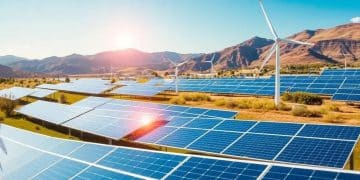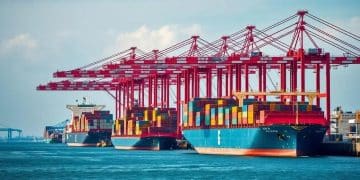U.S. relations with OPEC amid energy crisis

Anúncios
U.S. relations with OPEC amid the energy crisis are characterized by complex dynamics involving collaboration on renewable energy, market stability, and the impact of geopolitical tensions on oil prices.
U.S. relations with OPEC amid energy crisis are more important than ever. As global oil prices fluctuate, understanding these dynamics can reveal insights into energy policies and their implications for consumers.
Anúncios
Understanding the historical context of U.S.-OPEC relations
Understanding the historical context of U.S.-OPEC relations is crucial to grasping how energy dynamics shift today. These relations have evolved significantly over the decades.
In the early days, the United States relied heavily on oil imports, which pushed the need for stable relations with OPEC, a coalition of oil-producing countries.
Anúncios
Key Events Shaping Relations
Several pivotal events have influenced the interactions between the U.S. and OPEC:
- The 1973 oil embargo, which showcased the power OPEC holds over oil prices.
- The Iran-Iraq War in the 1980s, which disrupted oil supplies and prompted U.S. interest in Middle Eastern stability.
- The Gulf War of the early 1990s, where U.S. intervention was partly driven by securing oil supplies.
These instances highlight the interconnectedness of global politics and energy supply. As the world faces new energy challenges, it is essential to analyze past events.
Changing Tides of Diplomacy
In the 21st century, relations have become more complex. The rise of alternative energy sources has shifted the geopolitical landscape.
The United States has pursued a policy of energy independence, reducing reliance on OPEC oil. This shift has resulted in less direct influence from OPEC over U.S. energy prices.
However, the U.S. still engages with OPEC, as global economies remain intertwined. OPEC’s decisions can ripples across the market, affecting oil prices worldwide. Understanding these factors helps clarify why the U.S. continues to monitor OPEC’s movements closely.
Current challenges in energy diplomacy

Current challenges in energy diplomacy are numerous and complex. Countries today face a web of issues that affect their energy policies and international relations.
As global demand for energy grows, the need for effective diplomacy becomes even more pressing. With the rise of emerging economies and their energy needs, established powers must navigate these changes carefully.
Key Challenges in Energy Diplomacy
Several factors challenge the current landscape of energy diplomacy:
- Geopolitical tensions: Conflicts in oil-rich regions disrupt supply chains and create instability.
- Global warming: Environmental concerns push nations to adopt renewable energies, complicating existing agreements based on fossil fuels.
- Technological advances: New energy sources and technologies shift the balance of power, challenging traditional roles within the global energy market.
The interplay of these elements creates a dynamic and often unpredictable energy landscape. As nations grapple with these challenges, the essence of diplomacy becomes vital in fostering cooperation.
Furthermore, economic sanctions often play a critical role in shaping energy relationships between countries. When one nation imposes sanctions on another, it can severely disrupt energy flows, leading to heightened tensions.
The Impact of Climate Change Policies
Another pressing challenge is adapting to climate change policies. Nations that rely on fossil fuels are under pressure to reduce emissions, complicating their energy strategies. These policies can lead to conflicts and disagreements between countries that have different priorities regarding energy production and consumption.
Public sentiment also influences energy diplomacy. As citizens advocate for cleaner energy solutions, governments must respond to these demands, reshaping their international negotiations and agreements.
Impacts of the energy crisis on oil prices
The impacts of the energy crisis on oil prices have been profound and far-reaching. When an energy crisis occurs, the ripple effects can affect the global economy and energy consumers alike.
Supply and demand fluctuations are key factors. During an energy crisis, demand for oil often remains high while supply may dwindle due to geopolitical tensions or production limits. This imbalance leads to soaring prices that drive up costs for consumers and businesses.
Factors Driving Oil Price Increases
Several critical factors contribute to the rise in oil prices during an energy crisis:
- Geopolitical instability: Conflicts in oil-producing regions create uncertainty, which often leads to price spikes.
- Natural disasters: Events like hurricanes can disrupt production and transportation, causing immediate price increases.
- Speculation in markets: Traders react to perceived shortages, which can artificially inflate prices based on expectations.
As prices rise, consumers feel the pinch. Higher gasoline prices lead to increased transportation costs, affecting everything from goods to food prices. This chain reaction can strain household budgets and impact economic growth.
In contrast, some countries may benefit from rising oil prices. Oil-exporting nations often see increased revenues, which can bolster their economies. However, this does not eliminate the global struggle for energy security faced by many nations.
Long-Term Effects on Energy Policies
The energy crisis can also drive changes in energy policies. Governments may seek to diversify their energy sources to reduce reliance on oil. Investment in renewable energy technologies can accelerate as countries strive to create more sustainable energy systems.
These shifts are vital in ensuring energy stability and reducing vulnerability to future crises.
Future prospects for U.S.-OPEC collaboration

The future prospects for U.S.-OPEC collaboration are complex and will greatly depend on several evolving factors in global energy politics. As the landscape of energy continues to shift, both parties must navigate new challenges and opportunities.
With the increasing emphasis on renewable energy, OPEC member countries may need to adjust their strategies. The U.S., aiming for energy independence and promoting green technologies, could offer valuable partnerships.
Potential Areas of Collaboration
Several areas present opportunities for collaboration between the U.S. and OPEC:
- Technological sharing: Innovations in energy extraction and renewable technologies can be shared to improve efficiency.
- Sustainable practices: OPEC may engage in enhancing environmental sustainability within its operations, aligning with U.S. interests in reducing carbon footprints.
- Market stability: Both parties can work together to stabilize oil markets, ensuring prices remain fair for consumers and producers alike.
Notably, as global energy demands increase, the threat of conflicts may rise. Collaborative efforts can lead to diplomatic solutions that benefit both sides.
The role of non-traditional energy sources will also shape this collaboration. For instance, if OPEC diversifies into renewables, a partnership with the U.S. could enhance these efforts and provide mutual energy security.
Challenges Ahead
Challenges persist for fruitful collaboration. Geopolitical tensions, public opinion regarding fossil fuels, and rapid technological changes can hinder progress. Moreover, the global push for tackling climate change may reframe priorities.
As both the U.S. and OPEC navigate these challenges, their ability to adjust to changing demands will be crucial. Mutual benefit must remain at the forefront to foster a positive relationship and secure energy for the future.
FAQ – Questions about U.S.-OPEC Collaboration and Energy Relations
What are the key factors influencing U.S.-OPEC relations today?
Key factors include geopolitical tensions, the rise of renewable energy, and market dynamics affecting oil supply and demand.
How can the U.S. and OPEC collaborate in renewable energy?
They can share technology, research, and best practices to improve efficiency and sustainability in energy production.
What impacts do energy crises have on oil prices?
Energy crises can lead to increased oil prices due to supply shortages, heightened demand, and market speculation.
How important is diplomacy in U.S.-OPEC relations?
Diplomacy is crucial for navigating conflicts, stabilizing markets, and fostering collaboration for mutual benefits.





